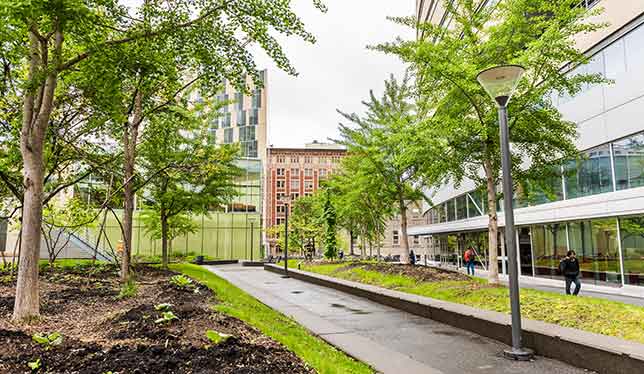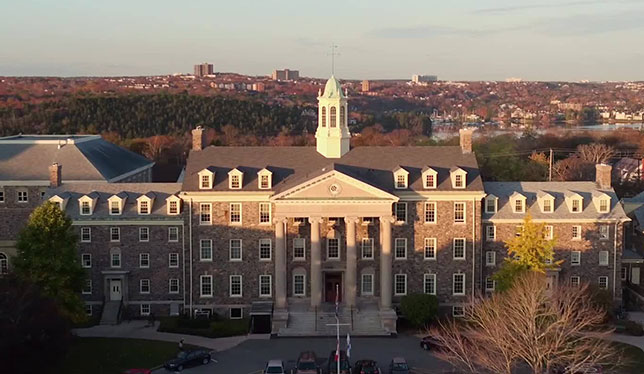It’s time to tackle climate change in all university disciplines
The entire university community should systematically incorporate issues of climate change and the collapse of biodiversity into introductory courses.

When I tell my colleagues that I’m trying to examine the links between physical activity, sports and climate change, the most common response is still: What’s the connection? My research focuses more generally on questions of health psychology. But after reading a number of books, opinion pieces, and especially the report from the Intergovernmental Panel on Climate Change, I’ve had something of a rude awakening. For example, over 15,000 researchers have sounded the alarm to remind us that humanity is in danger if we continue to exceed the Earth’s biophysical limits.
The efforts that will be needed to limit temperature increases to less than 2°C by 2050 are enormous. Canadians have one of the largest annual carbon footprints in the world (about 17.5 tons of carbon), which we will need to reduce to about two tons per person within 30 years.
While our university colleagues in climatology, geology and other fields have been doing a remarkable job of communicating these issues, we must be realistic: the necessary changes are not happening. Greenhouse gas emissions continue to increase in Canada. Other university researchers are making progress on climate issues in their respective disciplines, but remain isolated from one another. The next decade will be decisive for future generations. We need to find ways to leverage our combined efforts to make rapid progress, to an even greater extent than our response to COVID-19. To help achieve this, the entire university community should engage with this issue by systematically incorporating questions of climate change and the collapse of biodiversity into introductory courses. The students we teach will be on the front lines when it comes to managing the challenges associated with climate change. Philosophy, law, economics, health sciences, political science, engineering, the arts… All disciplines are affected by climate concerns.
Paradoxically, climate issues do not seem to be a central topic in the courses taught at Canada’s postsecondary institutions. An analysis of course syllabi suggests that less than half of the institutions surveyed were addressing climate change in 2014-15. In other countries, however, a number of initiatives have already been developed, from integrating climate issues into existing courses to the development of interdisciplinary degree programs or educational activities. We can start this process right now by integrating climate issues within general courses, developing a mandatory “climate change education” module as a requirement for earning a university degree, developing new interdisciplinary degree programs in environmental sciences that systematically incorporate ethical and social justice issues, or develop introductory workshops for students on basic climate and energy issues. There are a number of peer-to-peer initiatives in which students can serve as educators to their younger peers, such as the Climate Collage and the Carbon Literacy Project, as well as the online course entitled Changements climatiques et santé (Climate Change and Health) developed by the Institut national de santé publique du Québec.
Our teaching is connected to our research activities. As such, academics should be financially supported and encouraged by their governing bodies to develop research projects on climate issues within their field of expertise, or to take part in multi- and transdisciplinary projects. Unsurprisingly, the lack of funding for university research on climate change remains the biggest obstacle for researchers. Therefore, Canadian universities and granting agencies should make it an urgent priority to reorient their policies to favour research projects that focus directly or indirectly on reducing greenhouse gas emissions, and on the varying degrees to which Canada’s different communities are prepared to face the consequences of climate change.
Of course, investing time and energy on this issue is likely to slow down other projects, but the sacrifice is well worth it. Climate change will cause profound and sudden changes in our ways of living, consuming and producing. In Canada, coastal erosion is already forcing residents of the North Shore area to relocate. In addition, the country we live in is ranked 58th out of 61 on the climate change performance index. Not to mention that the countries at greatest risk of climate catastrophes are generally those with the least resources to deal with them.
Finally, it should be noted that young people clearly have an interest in climate change (ex. There were 400,000 participants at a Montreal demonstration in 2019), which could translate to significant investment in climate issues in their university studies, regardless of their chosen field.
Paquito Bernard is an associate professor in the department of physical activity sciences at the Université du Québec à Montréal, and a full-time researcher at the Centre de recherche de l’Institut universitaire en santé mentale de Montréal.
Featured Jobs
- Canada Excellence Research Chair in Computational Social Science, AI, and Democracy (Associate or Full Professor)McGill University
- Psychology - Assistant Professor (Speech-Language Pathology)University of Victoria
- Business – Lecturer or Assistant Professor, 2-year term (Strategic Management) McMaster University
- Education - (2) Assistant or Associate Professors, Teaching Scholars (Educational Leadership)Western University
- Veterinary Medicine - Faculty Position (Large Animal Internal Medicine) University of Saskatchewan















Post a comment
University Affairs moderates all comments according to the following guidelines. If approved, comments generally appear within one business day. We may republish particularly insightful remarks in our print edition or elsewhere.
5 Comments
Canada contributes less then 2% of the World’s GHG emissions. We do have a high per capita output, but we live in a large country, have an extreme climate and a relatively low population density. All our efforts to reduce GHG emissions, is more of a feel good exercise, as opposed to making a significant difference to total GHG load.
I was with you until the last sentence. This assertion rests on the flawed premise that nations and individuals operate in isolated silos, ignoring robust evidence of networked social influence that operates across borders in terms of policy, norms, and behavior change. The lifestyle choices of people all over the world are mutually influenced by each other.
Thank you Ron for your comment.
You focus on national greenhouse gaz emissions (GHG) inventory, however it’s a misleading indicator. The most adapted indicator is the “individual” carbon footprint of Canadian because we can compute the exported overseas GHG emissions. (almost 19 and 18 tons fo CO2/year for US and Canadian residents)
e.g., an example with USA carbon footprint :https://theconversation.com/5-charts-show-how-your-household-drives-up-global-greenhouse-gas-emissions-119968
Here, 2 important quotes to help you to understand the worldwide inequalities in term of carbon footprint (https://ourworldindata.org/per-capita-co2)
“In many of the poorest countries in Sub-Saharan Africa – such as Chad, Niger and the Central African Republic – the average footprint is around 0.1 tonnes per year. ”
“In just 2.3 days the average American or Australian emits as much as the average Malian or Nigerien in a year. ”
This idea is completely unnecessary. Putting aside the increased cost in an environment of stretched budgets (Noting the financial collapse of Laurentian University and https://thevarsity.ca/2020/10/18/statistics-canada-projects-financial-losses-for-canadian-universities-decrease-in-international-enrolment/). The idea of climate change is the construct of globalists, in an effort to further tax and control western democracies. Man made climate change is a myth. 97% of the earths weather is dependant on the sun (Milankovitch Cycles). Canada’s contribution to CO2 emissions is likely negative in light of land mass and plant cover. We need to move away from these UN trigger points and get back to common sense education.
Thank you Hinchy for your comment.
I respect your point of view. I share with you a Wikipedia link presenting the ‘World Scientists’ Warning to Humanity: A Second Notice’ signed by more than 15,000 climate scientists. It is a very short text presenting the most important information about the risks for humanity associated with climate change consequences.
https://en.wikipedia.org/wiki/World_Scientists%27_Warning_to_Humanity
The original article is available here : https://scientistswarning.forestry.oregonstate.edu/sites/sw/files/Warning_article_with_supp_11-13-17.pdf
P.Bernard